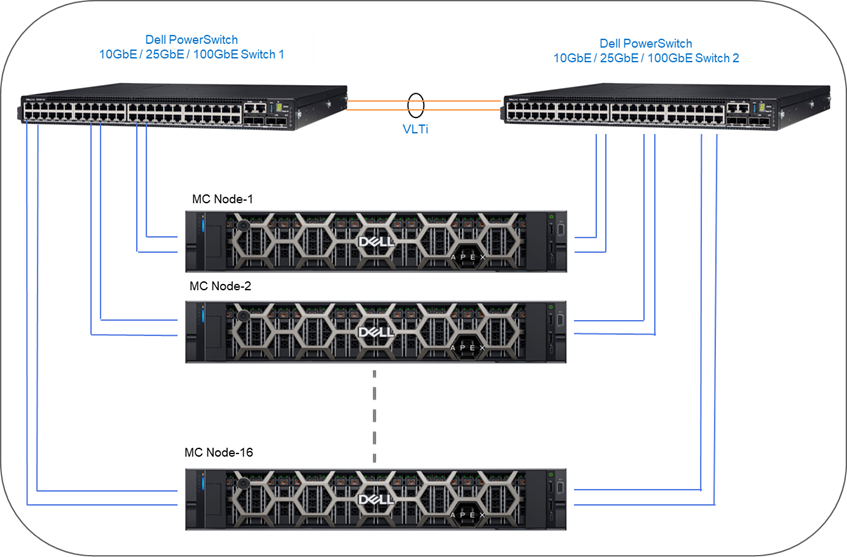Modern enterprises depend on their IT departments to facilitate operations and maintain a competitive edge in the market. Many businesses are embracing a multicloud approach to fuel their endeavors and expedite the deployment of applications. Dell Technologies’ portfolio of solutions can help enterprises quickly implement their multicloud strategy and greatly simplify overall operations.
Dell APEX Cloud Platform for Microsoft Azure is a turnkey, on-premises infrastructure built collaboratively with Microsoft to extend and optimize Azure on-premises. The platform is the first offer in Microsoft’s newly created Premier Solutions category for Azure Stack HCI, representing highest levels of integrations and the fastest time to value.

Dell Networking for Dell APEX Cloud Platform for Azure
The network considerations for Dell APEX Cloud Platform for Azure are no different than those of any enterprise IT infrastructure: availability, performance and scalability. Dell APEX Cloud Platforms for Azure are manufactured in the factory according to your specifications and delivered to your data center ready for deployment. The overall solution has been tested with Dell PowerSwitch platforms. The nodes in the Dell APEX Cloud Platform for Azure can attach to Dell networking Top-of-Rack (ToR) switch, which meets the Microsoft Azure Stack HCI network functional requirements.
Network Redundancy and Performance
APEX Cloud Platform for Azure utilizes physical top-of-rack switching for network communications and is engineered to enable full redundancy and failure protection across the cluster. For customer environments that require protection from a single point of failure, the adjacent network supporting the APEX Cloud Platform for Azure cluster must also be designed and configured to eliminate any single point of failure. Dell offers the following scalable Networking Topologies for APEX Cloud Platform for Azure, which customers can choose to implement to expand to maximum cluster size of 16 nodes.
- Fully converged. RDMA, cluster management and VM traffic traverse the same Ethernet connections, thus conserving switch ports and cabling required per node.
- Non-converged. Separates RDMA and host management / VM traffic onto separate network adapter interfaces. Ensures no contention between storage and LAN communications and can be easier to troubleshoot.

Dell-on-Dell Value Proposition
Having end-to-end stack from Dell Technologies enables customers to build a cohesive and efficient IT infrastructure, allowing them to focus on their core business objectives rather than managing complex and disparate infrastructure components. Dell-on-Dell value proposition for integrated networking, storage, and compute solutions offers the following benefits:
- Seamless integration of Dell networking with Dell APEX Cloud Platform for Azure, which simplifies deployment, management and maintenance, reducing the risk of inter-operability issues.
- Optimized and overall better system performance when Dell APEX Cloud Platform for Azure is deployed with Dell Networking.
- Single point of support across overall deployment, providing a consistent service experience.
- Competitive pricing for Dell APEX Cloud Platform for Azure solution with networking offers compared to standalone components from various vendors.
- Reduced complexity and efficient management translate into lower operational expenses (OpEx).
- Regular and seamless system updates across the Dell APEX Cloud Platform for Azure ecosystem.
Learn more about Dell APEX Cloud Platform for Microsoft Azure and Dell Enterprise SONiC, and discover more technical specs here.

